virtual salons
If you have registered for the event and would like to provide your salon preferences click here.
During the 1948 War of Independence, American Jews provided Israel with unprecedented levels of assistance. They were motivated by a blend of emotions: pride in the state’s establishment and fear for its survival, compassion for Jewish victims of the Holocaust, and guilt for having passed World War II on safe ground while two thirds of European Jewry was murdered. These feelings were shared by Jews far beyond the relatively small circle of Zionist activists. During the 1948 war, American Jews formed a diffuse, informal, yet tightly bound emotional community.
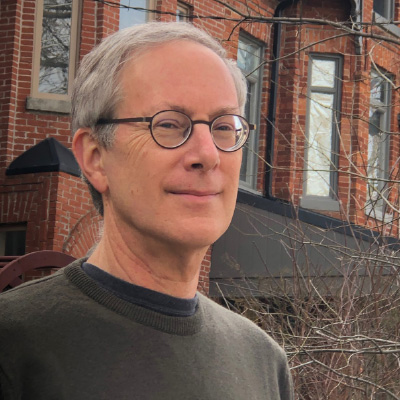 About Derek Penslar: Derek Penslar is the William Lee Frost Professor of Jewish History at Harvard University. He has previously taught at Indiana University, the University of Toronto, and Oxford, where he was the inaugural Stanley Lewis Professor of Modern Israel Studies. Derek has published 10 books, most recently, Theodor Herzl: The Charismatic Leader (2020). He is currently writing a book titled Zionism: An Emotional State for Rutgers University Press’ series on “Keywords in Jewish Studies.” He is co-editor of The Journal of Israeli History, a Fellow of the Royal Society of Canada, and President of the American Academy for Jewish Research.
About Derek Penslar: Derek Penslar is the William Lee Frost Professor of Jewish History at Harvard University. He has previously taught at Indiana University, the University of Toronto, and Oxford, where he was the inaugural Stanley Lewis Professor of Modern Israel Studies. Derek has published 10 books, most recently, Theodor Herzl: The Charismatic Leader (2020). He is currently writing a book titled Zionism: An Emotional State for Rutgers University Press’ series on “Keywords in Jewish Studies.” He is co-editor of The Journal of Israeli History, a Fellow of the Royal Society of Canada, and President of the American Academy for Jewish Research.
For modern Jewish writers contemplating the most tumultuous times imaginable, resistance takes many forms: physical, spiritual, political, social, verbal. Avrom Sutskever, a partisan fighter who emigrated to Israel, understood what resistance meant in times of war. Yankev Glatshteyn, an émigré from Poland to the U.S., resisted the idea that rebuilding Jewish life might mean forgetting Jewish history. Both were Yiddish poets writing during and after the Second World War. We’ll look at one short poem by each of these authors and talk about what forms resistance may take.
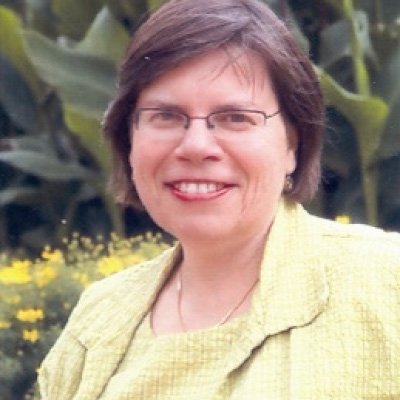 About Anita Norich: Anita Norich is Collegiate Professor Emerita of English and Judaic Studies at the University of Michigan. Her most recent book, A Jewish Refugee in New York (2019), is a translation of a Yiddish novel by Kadya Molodovsky. She translates Yiddish literature, and teaches, lectures, and publishes on a range of topics concerning modern Jewish cultures, Yiddish language and literature, Jewish American literature, and Holocaust literature.
About Anita Norich: Anita Norich is Collegiate Professor Emerita of English and Judaic Studies at the University of Michigan. Her most recent book, A Jewish Refugee in New York (2019), is a translation of a Yiddish novel by Kadya Molodovsky. She translates Yiddish literature, and teaches, lectures, and publishes on a range of topics concerning modern Jewish cultures, Yiddish language and literature, Jewish American literature, and Holocaust literature.
In its 123 years of existence, the Forward news organization has flexed, stretched and like the most devoted yogi, morphed and persisted.
As a language surviving its attempted destruction as well as its own speakers’ frequent ambivalence, Yiddish can surely be said to embody resilience. Resilience, frequently translated in Hebrew as gmishut or flexibility, is similarly in Yiddish defined as elastishkayt.
In 1918, at the height of the rapidly unfolding influenza pandemic, the Forward once more flexed and brought readers the latest flu-related health and public safety news, and more. They published the latest Yiddish short stories on the topic, accepted ads from at least once furniture shop that read more like a pandemic public service announcement, and kept up with the inner workings of city government as it regulated around the illness, and those of beloved local rabbis seeking to both console and manage Jewish traditions around death and shiva.
In this presentation the speakers share some of those original 1918 wonders of Yiddish journalism, in translation, and consider their prescience and resonance in today’s ongoing climate. Together, we’ll model our own elastishkayt as we uncover points of resilience in the Forward writers and readers back then and ongoing.
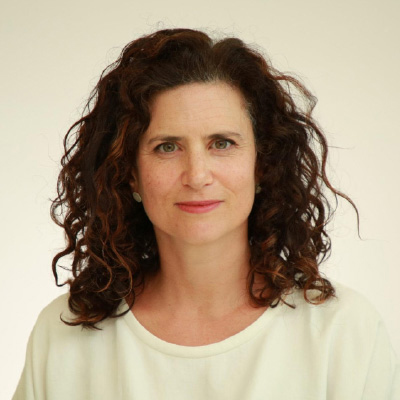 About Rachel Feddersen: Publisher and CEO of the Forward, Feddersen has been an innovator in digital media since the earliest days of Silicon Alley. She is passionate about creating and supporting the most engaging media properties, and exploring new ways of reaching readers, wherever they may be. She has worked with audiences of many millions, as Chief Content Officer of Patch, with its 900 sites across the country; Digital GM at MentalFloss.com and TheWeek.com, thought-leading brands for millennials and global citizens; and editor-in-chief of Parenting.com.
About Rachel Feddersen: Publisher and CEO of the Forward, Feddersen has been an innovator in digital media since the earliest days of Silicon Alley. She is passionate about creating and supporting the most engaging media properties, and exploring new ways of reaching readers, wherever they may be. She has worked with audiences of many millions, as Chief Content Officer of Patch, with its 900 sites across the country; Digital GM at MentalFloss.com and TheWeek.com, thought-leading brands for millennials and global citizens; and editor-in-chief of Parenting.com.
Since her arrival at the Forward in 2016, Rachel has been leading the Jewish news organization during an increasingly complex time for traditional journalism, spearheading a fully digital transformation as the celebrates 123 years of existence.
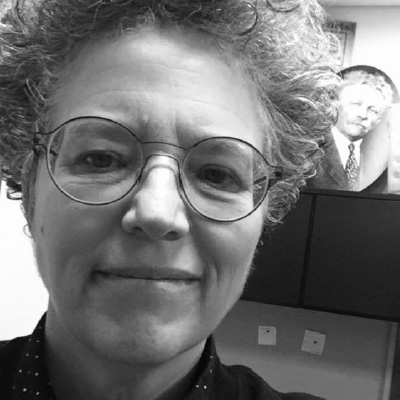 About Chana Pollack: Chana Pollack is the Forward’s archivist providing research, translation, and production of original Forward archival content. She frequently presents on the Forward’s archival material. Most recently, she spoke about the exhibition “Pressed” with the Museum at Eldridge Street’s curator Nancy Johnson on Untapped NY. The exhibition featured theForward archive’s collection of photo press plates. She also appeared in the public television documentary film “Fire of a Movement” about the Forward’s coverage of the Triangle factory fire.
About Chana Pollack: Chana Pollack is the Forward’s archivist providing research, translation, and production of original Forward archival content. She frequently presents on the Forward’s archival material. Most recently, she spoke about the exhibition “Pressed” with the Museum at Eldridge Street’s curator Nancy Johnson on Untapped NY. The exhibition featured theForward archive’s collection of photo press plates. She also appeared in the public television documentary film “Fire of a Movement” about the Forward’s coverage of the Triangle factory fire.
When asked about why he studied Jewish history, Cecil Roth quipped “because it’s fun.” Roth spoke these words after World War II, well aware of what happened to Jews in Europe, and yet, like his American colleague Salo Baron, he too was committed to emphasize the non-lachrymose aspects of Jewish history. This was not in denial of Jewish suffering. Both Salo Baron and Cecil Roth understood that part of Jewish history very well. It was to show the vibrancy of Jewish life, culture, and history, for both historians were interested in the “perseverance” and “survival” of Jews—evidence of the times in which they were writing—and as such they knew that they needed to study more than moments of defeat and destruction.
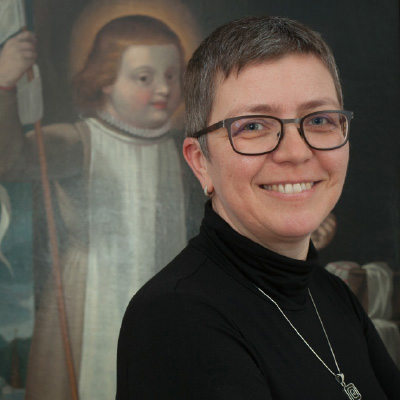 About Magda Teter: Magda Teter is Professor of History and the Shvidler Chair of Judaic Studies at Fordham University. She is also a fellow of the American Academy for Jewish Research and the author of Blood Libel: On the Trail of An Antisemitic Myth (Harvard 2020). Teter is the NEH Senior Scholar at the Center for Jewish History (2020-2021). She has been a Harry Starr Fellow in Jewish Studies at Harvard University, an Emeline Bigelow Conland Fellow at the Radcliffe Institute for Advanced Studies, also at Harvard University, and the Mellon Foundation fellow at the Cullman Center for Scholars and Writers at the New York Public Library. (Photo of Magda Teter by Chuck Fishman.)
About Magda Teter: Magda Teter is Professor of History and the Shvidler Chair of Judaic Studies at Fordham University. She is also a fellow of the American Academy for Jewish Research and the author of Blood Libel: On the Trail of An Antisemitic Myth (Harvard 2020). Teter is the NEH Senior Scholar at the Center for Jewish History (2020-2021). She has been a Harry Starr Fellow in Jewish Studies at Harvard University, an Emeline Bigelow Conland Fellow at the Radcliffe Institute for Advanced Studies, also at Harvard University, and the Mellon Foundation fellow at the Cullman Center for Scholars and Writers at the New York Public Library. (Photo of Magda Teter by Chuck Fishman.)
Jewish history is punctuated by moments of great crisis and loss of life. Yet time after time, different Jewish societies have managed to pick themselves up, deal with all the suffering and trauma, and resume their lives. How is this possible? What is it in the Jewish tradition that has given Jews over the ages the strength they need? In this brief talk, Teller will explore the question on the basis of the Jewish experience in the wake of the great massacres of 1648 and the refugee crisis that followed. We will see how the interplay of halakhic wisdom, Jewish ritual and custom, as well as the Jews’ spiritual and psychological insight, allowed them not only to recover from the terrible blows but to come into the modern age strengthened by the experience.
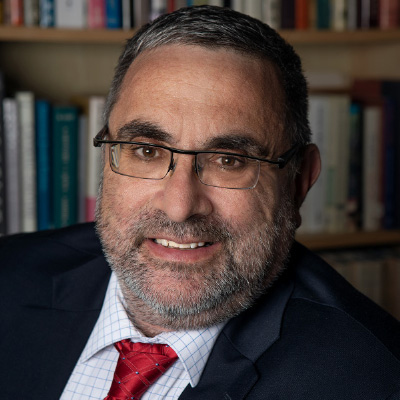 About Adam Teller:Adam Teller is Professor of History and Jewish Studies at Brown University. Born in London, he taught for many years in Israel before coming to the United States a decade ago. An expert in the social, economic, religious, and cultural history of the Jews in eastern Europe, his most recent book, Rescue the Surviving Souls: The Great Jewish Refugee Crisis of the Seventeenth Century, was published this year by Princeton University Press.
About Adam Teller:Adam Teller is Professor of History and Jewish Studies at Brown University. Born in London, he taught for many years in Israel before coming to the United States a decade ago. An expert in the social, economic, religious, and cultural history of the Jews in eastern Europe, his most recent book, Rescue the Surviving Souls: The Great Jewish Refugee Crisis of the Seventeenth Century, was published this year by Princeton University Press.
Enjoy a behind-the-scenes look with a curator at an upcoming joint exhibition of the Center for Jewish History and the Museum of Chinese in America, highlighting the life and work of little-known Polish-Jewish photojournalist and Chinatown resident Emile Bocian, who photographed the sites and personalities of his adopted neighborhood throughout the 1970s and 80s. Working for a Chinese-language daily, he documented everything from cultural events and protests to ordinary citizens at work and play, as well as images of storefronts and streetscapes that provide a glimpse into a vanishing New York.
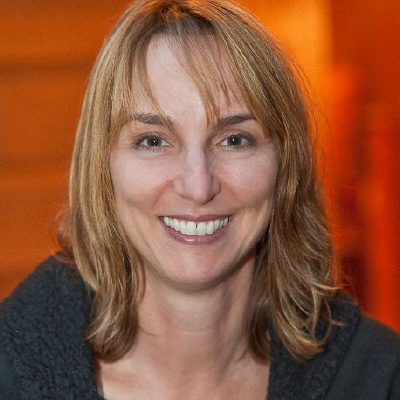 About Lauren Gilbert: Co-curator of the Emile Bocian exhibit, Lauren Gilbert joined the Center in early 2019 on the heels of 18 years in public and academic libraries in reference, outreach, and public programming. In her current role as Senior Manager for Public Services, she oversees access to the Partner collections for scholars, students, genealogists, educators, and the general public in the Center’s Lillian Goldman Reading Room and Ackman & Ziff Family Genealogy Institute. She completed graduate studies in art history at New York University and holds an MLS from the Palmer School of Long Island University with a Certificate in Archives and Manuscripts.
About Lauren Gilbert: Co-curator of the Emile Bocian exhibit, Lauren Gilbert joined the Center in early 2019 on the heels of 18 years in public and academic libraries in reference, outreach, and public programming. In her current role as Senior Manager for Public Services, she oversees access to the Partner collections for scholars, students, genealogists, educators, and the general public in the Center’s Lillian Goldman Reading Room and Ackman & Ziff Family Genealogy Institute. She completed graduate studies in art history at New York University and holds an MLS from the Palmer School of Long Island University with a Certificate in Archives and Manuscripts.
Entering a bullfighting ring in Mexico for the first time in 1923, Sidney Franklin launched a decades-long career as the world’s first Jewish matador. Secretly gay, celebrated by the likes of Ernest Hemingway and starring alongside Paulette Goddard and Eddie Cantor, “El Torero de la Torah” travelled a long way from his upbringing as the fifth of ten children of Russian-born, Orthodox Jewish parents in Brooklyn. Franklin’s story unfurls with visual richness and flair in his archival collection at the American Jewish Historical Society at the Center for Jewish History.
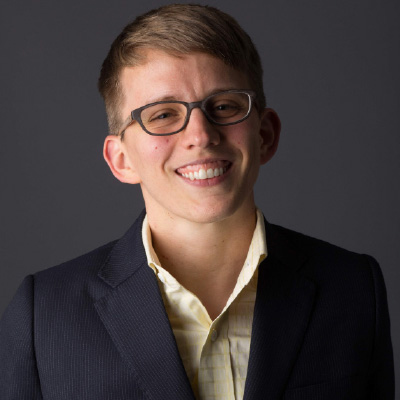 About Rachel Miller: As Director of Archive and Library Services at the Center for Jewish History, Rachel Miller leads an innovative team of archivists, librarians, conservators, digital photographers, and exhibition staff whose mission is to maximize access to and ensure the long-term preservation of Partner archive, library and museum collections. Miller started as an archivist at the Center in 2008, after receiving her Masters in Library and Information Science from Rutgers University.
About Rachel Miller: As Director of Archive and Library Services at the Center for Jewish History, Rachel Miller leads an innovative team of archivists, librarians, conservators, digital photographers, and exhibition staff whose mission is to maximize access to and ensure the long-term preservation of Partner archive, library and museum collections. Miller started as an archivist at the Center in 2008, after receiving her Masters in Library and Information Science from Rutgers University.
Now more than ever, exploring and recording your family history is an important and worthwhile pursuit. Join the Center’s genealogy librarians to discover how they have helped researchers uncover historical connections and find surprising and meaningful clues to their families’ pasts. Share what your family history means to you!
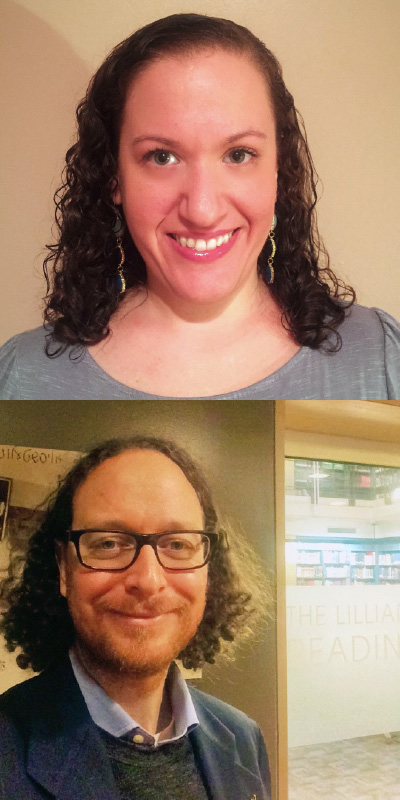 About Moriah Amit and J.D. Arden: Moriah Amit, Senior Reference Services Librarian, coordinates the Ackman & Ziff Family Genealogy Institute’s operations and public programming. Reference Services Librarian J.D. Arden offers research assistance at the Genealogy Institute and teaches a class on genealogy research at the Palmer School of Library and Information Science. As the Center’s genealogy librarians, Amit and Arden lead workshops, conduct outreach to senior centers and community groups, and direct family history researchers to relevant resources online as well as at the Center for Jewish History and beyond. They both completed their MSLIS degrees at the Pratt Institute.
About Moriah Amit and J.D. Arden: Moriah Amit, Senior Reference Services Librarian, coordinates the Ackman & Ziff Family Genealogy Institute’s operations and public programming. Reference Services Librarian J.D. Arden offers research assistance at the Genealogy Institute and teaches a class on genealogy research at the Palmer School of Library and Information Science. As the Center’s genealogy librarians, Amit and Arden lead workshops, conduct outreach to senior centers and community groups, and direct family history researchers to relevant resources online as well as at the Center for Jewish History and beyond. They both completed their MSLIS degrees at the Pratt Institute.
